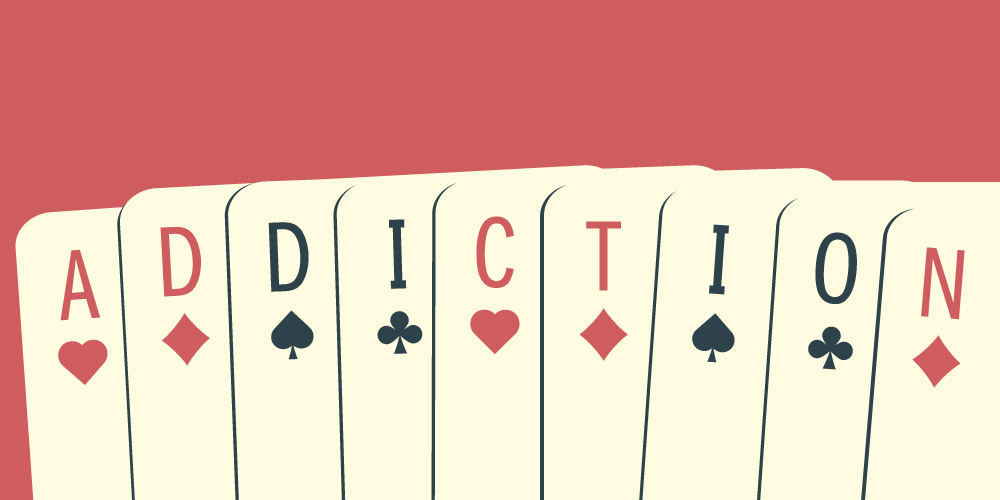Behavioural Addictions
Behavioural addictions in many ways are no different to other forms of substance dependence. Although behavioural addictions may not involve drugs or alcohol, their impact on society are just as damaging.
A behavioural addition is a form of addiction that involves risky behaviours such as gambling, where an individual feels compelled to seek risky behaviours despite negative consequences. These negative consequences often result in financial ruin or the breakdown of relationships.
A recent study found that those with gambling problems were three times more likely to commit suicide, this highlights how important it is to recognise the signs of behaviour-related addictions, which can be subtle unlike substance use disorder.
Addiction isn’t immediately recognisable as something that can overwhelm and possibly become extremely toxic; it is sometimes a small coping mechanism that provides minor relief. Understanding the signs and symptoms of various addictive behaviours will help you to seek treatment for yourself or someone you love.
What is a Behavioural (Process) Addiction?
Behavioural addiction is a coping mechanism that provides temporary relief from the stresses of life that individuals are trying to escape from. This leads to a reliance on behavioural patterns that assist in avoidance of facing the problems at hand. Behavioural addiction may start as an innocent alternative with little to no consequence to one’s health and well-being, but the toxic nature of these behaviours are concerning when the behaviour becomes a compulsion rather than a choice.
The absence of a tangible substance sometimes makes the awareness of the condition harder to pinpoint. The unregulated behaviour is then noticed when the addictive behaviour overtakes regular healthy behaviour.

Types of Behavioural Addictions
Over time the focus on addiction has mostly been on substance addiction and abuse, but behavioural addictions are getting more attention as a dangerous crutch that individuals in distress are turning to for immediate and short-term relief. Below are a list of some of the more commonly known addictive behaviours.
The common thread that can be found with all of these examples of behavioural addiction is a mental breakdown in understanding of how these behaviours are becoming progressively toxic for the individual. Another pattern noticed is the escalating frequency and reliance on these behavioural tendencies.
Gambling Addiction
Gambling addiction is the unreasonable necessity to gamble, as opposed to gambling recreationally with no attachment to the outcome and no fear of loss, but with a healthy respect for the fact that loss should be the indicator to stop. This addiction has many different names, i.e. gambling disorder, pathological gambling and compulsive gambling. The following symptoms are used to diagnose gambling addiction:
- Obsessive focus on gambling
- The feeling of relief or release when gambling
- Lying to protect the gambling habit
- Redirecting money to feeding a gambling habit instead of paying necessary bills.
Gaming Addiction
Gaming addiction is also known as video game addiction, and while it is not widely recognised as an addiction, behaviour of gamers points to the many indications of addictive behaviour. The unfortunate reality of this addiction is that it starts as a hobby and an activity of social interest and inclusion. It is also concerning that it is marketed to children, who develop this addiction at a stage in their lives where they are developing behaviours. It becomes toxic and dangerous to a person’s mental and physical well-being when they cannot say no to video games. The signs of addiction could be the following:
- Headaches and exhaustion from being in one position in front of a screen
- Becoming unsociable because of the need to play video games
- Exhibiting irritability and restlessness
- Lack of sleep due to excessive gaming.
Food Addiction (Binge Eating)
Food addiction is often described as the uncontrolled urge to eat constantly. This addiction is dangerous to a person’s mental and physical well-being.
Research has shown that the brain perceives certain foods as an addictive substance and the repeated consumption leads to addictive behaviours that are recognised as substance abuse. This constant loop between food and the activated reward and temporary pleasure centre is why food addicts find it difficult to break this habit. The signs of food addiction are defined by the following:
- Eating food that makes you feel sick, but you still ‘need’ to eat it
- Immediate sense of guilt due to overeating but ignoring this feeling
- Physical exhaustion and sluggishness
- Mental fog and lack of focus
- Poor sleeping patterns and physical pain.
Internet Addiction
Internet addiction is the excessive activity on electronic devices, usually to access the internet to the point of excluding all other outside activities. This behaviour displays as a lack of social activity with others due to the constant use of one’s phone or computer. The following points will help to further point to internet addiction:
- A false sense of reality, with a temporary sense of pleasure
- Lack of time management due to extensive periods of time in front of the computer or phone
- Poor sleep patterns
- Requiring excessive attention or praise on social media channels. Feeling down if posts do not receive likes, comments or shares
- Body aches, especially in the neck and shoulder area.
Shopping Addiction
A shopping addict has an obsession with buying things regardless of whether they need it or not. This is a compulsive behaviour that they have no control over. The addiction is as a result of how they feel every time they give in to shopping and wanting to continuously hold on to that feeling. Diagnosing a shopping addict is difficult because of the behaviour being one that is a cultural activity, therefore one needs to look at the following as possible symptoms when making this diagnosis:
- Not being limited to what one can afford and spending beyond this
- Using shopping as an answer to feeling emotionally challenged
- Uncontrolled shopping sprees
- Facing financial problems doesn’t make a shopping addict stop their shopping.
Work Addiction
Work addicts are often referred to as workaholics. They display the inability to stop working to exclusion of all else and it is a dangerous and addictive behaviour. The behaviour is driven by different factors which are common to addiction, i.e. emotional challenges and the compulsive need to dull the resulting mental and physical strain these emotions bring up. The compounded need to achieve perfection and a status create a stressful environment. These are possible symptoms of work addiction:
- Regularly working overtime, when not required
- Not sleeping well due to constantly thinking about work
- Fearing failure and being fixated on not making mistakes
- Not being happy with work-related achievements and obsessing about doing better.
Plastic Surgery Addiction
Plastic surgery addiction is considered to be a behavioural disorder that causes a person to change their appearance because they are always unhappy with the way they look. They experience body dysmorphia disorder which is a mental health disorder in which a person becomes obsessed with their perceived physical faults.
This mental disorder begins as a lack of self-esteem and if not addressed early, can lead to addiction. The person is willing to go through the pain, expense and possible risks of an optional surgical procedure to alter their appearance and if done continuously, can prove detrimental to their health. This condition affects their ability to have healthy and meaningful lives because of their constant discontent with the self.
Sex Addiction
Sex addiction is often normalised as “someone who enjoys having sex”, but the reality of sex addition is far more damaging to the individual and those they hurt.
Sex addiction is defined as an obsessive and compulsive desire to fulfil sexual needs or fantasies with no regards to consequences. Those struggling with sex addiction will fantasise about potential sexual partners and damage existing relationships. Sex addiction may also be linked with pornography addiction and excessive masturbation.
If you or someone you care about is struggling with sex addiction, they will often view sexual partners as objects, with little to no regards for their mental well-being or happiness.

The Relationship Between Mental Health & Behavioural Addictions
Substance abuse has an immediate and understandable effect on our mental and physical well-being that has been well-documented. However, behavioural addictions that are used as substitutes for substance abuse have an equal and, sometimes worse long-term effect on individuals who don’t realise they have a serious disorder. Behavioural disorders are examined through mental health investigative processes on how an individual reacts to situations and responds to therapeutic measures.
It is worth noting that those that experience existing mental health challenges are more likely to succumb to behavioural addictions because of their highly sensitive state and their need to find a solution that helps them function in society. It is with this understanding that we ensure that we, as society, do not shame people who are suffering with mental health issues and who also become victims to addiction. Providing them with a compassionate solution is the way to help people heal from addiction.
The Dangers Associated with Behavioural Addictions
Undiagnosed and therefore untreated behavioural addictions have a long-term and compounded traumatic effect on the individual as well as the people that they are close to.
Behavioural disorders are habits that require support and need to be enabled by a certain element of society. An individual’s addictive behaviour has a negative impact on their life and those that care about them.
Behavioural addictions often result in dysfunctional relationships, financial issues, poor mental health, sleep disturbances, work related performance and in severe cases, suicide.
While substance addictions can result in physical manifestations, behavioural additions may be harder to spot and can often go unaddressed for many years.

Getting Help
The first step to treating behavioural addictions is to recognise that the problem exists. When one becomes aware of this, they can seek help from a therapist or counsellor. An effective form of treatment is Cognitive Behavioural Therapy (CBT) that helps an individual to learn how to identify and begin the process of changing these patterns that lead to destructive behaviour.
CBT includes the process of identification of behavioural addiction and then working with an individual to find the right strategies for them to create new coping mechanisms that are healthy. The treatment process is a very active one between the therapist and the patient. The goals and outcomes of CBT are very focused on the solution and continuing work that the patient will need to do in order to maintain an optimum level of mental health.
For those looking for more tailored and structured treatment, as opposed to outpatient services offered by the NHS and other charities throughout the UK, private addition treatment may be better suited for those looking for immediate relief.
Residential treatment is offered throughout the UK for all behavioural related addictions. These services come with many advantages including:
- Immediate entry into a rehab programme
- One to one and group therapy sessions with experienced addiction therapists
- Daily monitoring and support
- Therapeutic settings away from the daily stress of life
Speak to our team today to learn more about the different options available.
